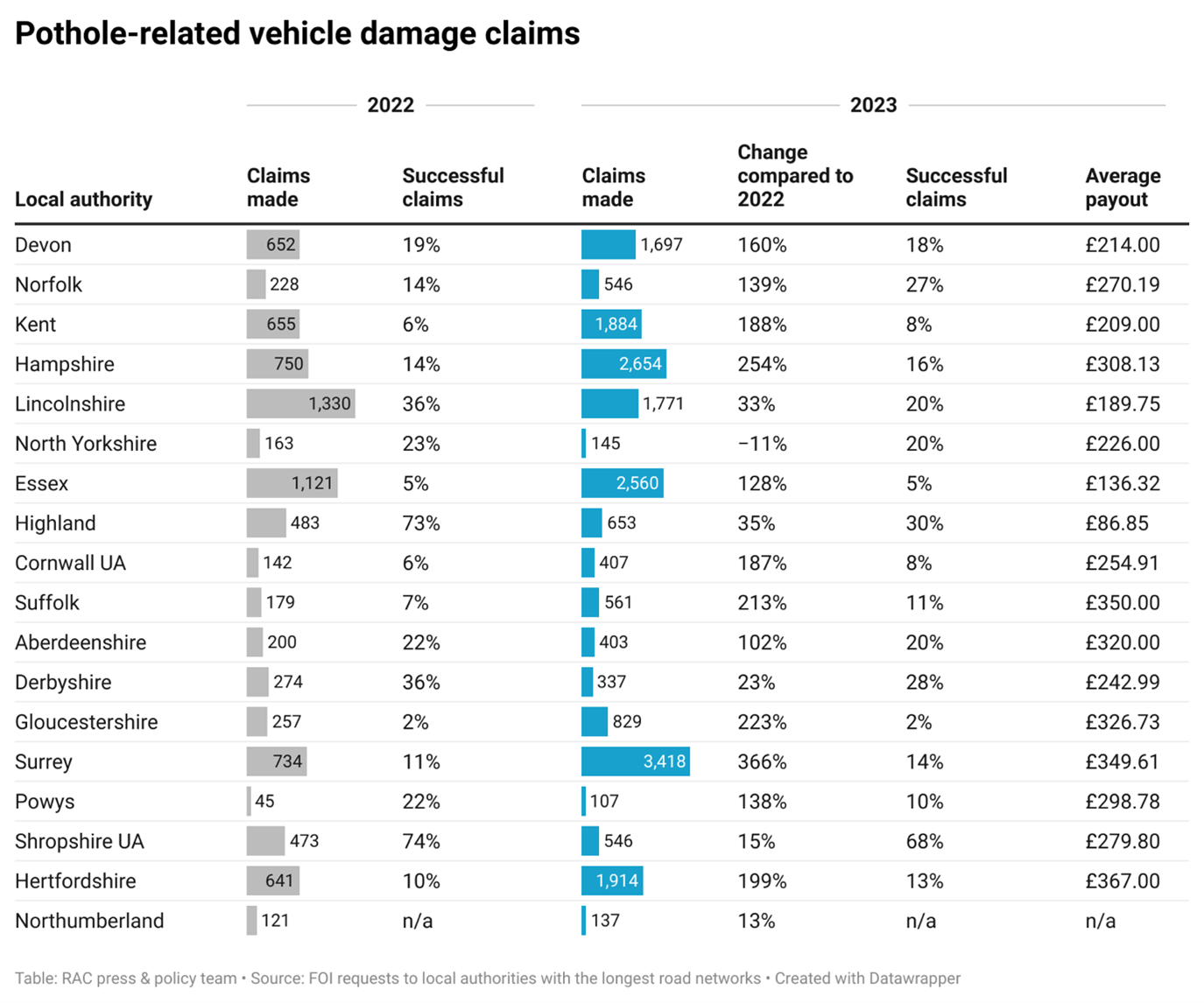A huge rise in pothole compensation claims has been revealed, but new data suggests just 15% of local authorities end up paying towards vehicle repairs.
Pothole compensation claims submitted to 18 local authorities, with the longest road networks in Britain, more than doubled in the 12 months between 2022 and 2023, from 8,327 to 20,432, analysis by the RAC shows.
It submitted a Freedom of Information (FOI) request to 21 councils covering almost 92,200 miles of local roads.
From the 18 that responded, Surrey County Council saw the biggest increase in claims, from 734 in 2022 to 3,418 in 2023.
Hampshire County Council was second, where claims rose from 750 in 2022 to 2,654 last year, followed by Gloucestershire County Council, where claims increased from 257 in 2022 to 829.
However, 17 councils paid out just 15% (3,131) of the 20,432 claims submitted by drivers in 2023.
The RAC estimates this equates to a total of around £824,000 paid out at an average of just £260 per claim.
Five councils refused nine-in-10 pothole claims
The chances of making a successful claim for pothole compensation are very limited, according to the FOI request, with 13 of the 17 councils that paid drivers any compensation for pothole damage refusing more than three-quarters of the claims they received in 2023.
Furthermore, according to the FOI data, five councils refused nine-in-10 pothole claims last year.
Gloucestershire County Council refused 98% of its 829 claims; Essex County Council refused 95% of its 2,560 claims; Kent and Cornwall Councils both refused 92% of their 1,884 and 407 respective claims; and Powys County Council refused 90% of its 107 claims.

Surrey refused the greatest number of pothole compensation claims in 2023, refusing 86% (2,954) of the 3,418 claims it received.
Only Shropshire Council paid more than 30% of the compensation claims it received, paying 68% of its 546 claims in 2023.
The numbers also show that as pothole damage claims have increased, the proportion of claims refused by councils has risen slowly too.
Between 2021 to 2023, the average number of claims refused has risen by five percentage points, from 76% to 81%.

The RAC also asked councils how many claims for compensation they refused due to the authority saying it was not aware of the existence of the potholes in question, under Section 58 2d of the Highways Act 1980.
Of the 8,172 compensation claims refused by the nine councils that provided data for this question, an overwhelming majority – 74% (6,028) – were refused on Section 58 grounds in total.
Gloucestershire and Hertfordshire councils both stated that every single claim (100%) they refused was because they did not know that a particular pothole existed.
Claims per mile of road
Looking at the number of claims per mile of road, for which 18 councils provided data, Surrey received the equivalent of one pothole claim for every single mile of its 3,410-mile road network – 3,418 total claims in 2023.
Hampshire, Essex and Hertfordshire all received a pothole claim for every two miles of their respective 5,641, 5,188 and 3,110 miles of roads.
Hampshire had 2,654 claims, Essex 2,560 and Hertfordshire received 1,914 in 2023.
Kent and Lincolnshire had claims for every three miles of their 5,822 and 5,559-mile networks, with a total of 1,884 and 1,771 respective claims each.
Meanwhile Gloucestershire had claims for every four miles of its 3,496-mile stretch, totalling 829 claims last year.
Legal fees to defend compensation claims
The data also shows that last year, 13 of the 18 councils that responded to the RAC paid out more than £166,000 in legal fees to defend pothole claims from drivers.
Lincolnshire County Council spent nearly £96,000 defending itself against some of the 1,771 pothole claims it received in 2023.
Devon County Council was the second biggest spender, although at a much lower fee of £33,232, while Essex County Council spent almost £20,000 (£19,685).
The fee total then drops below £10,000 for all other authorities.

RAC head of policy Simon Williams said: “While some councils appeared to prioritise paying legal fees over settling pothole claims, the cost in time and money of defending claims appears to far outweigh the expense of reimbursing drivers for the damage done to their vehicle in the first place.
“Even if a driver successfully pursued compensation, the average sum paid out of £260 is often well below the cost to fix a pothole-damaged car, for anything more serious than a punctured tyre.”
A fifth (21%) of insurance claims where a car hit a pothole leads to the vehicle being declared an insurance write-off, according to data from Allianz.
The insurer has paid out more than £4.6 million for 1,266 pothole claims since the start of last year.
It has paid out 1,114 single-vehicle pothole claims – an accident where no other vehicle is involved – with 225 vehicles being deemed beyond economical repair and the average total loss claim costing £7,900.
In one incident in 2023, a BMW 7 series M-Sport hit a pothole on an A-road while travelling at 60mph. The impact caused so much damage that the car had to be written-off, with Allianz paying a claim totalling £53,000.
Williams believes that when it comes to the true extent of the problem, we may only be seeing the tip of the iceberg, as almost the same number of councils refused to tell the RAC why they threw out pothole claims compared to those that did.
The RAC is strongly urging fleets and drivers to inform councils about any potholes they are aware of, either via the RAC’s website or using the free Stan app, which collects data on the state of UK roads.
Williams said: “We have long argued that local authorities need greater certainty of funding so they can tackle to the root cause of the UK’s pothole plague.
“For this reason, we’re pleased they’ll receive £500m to soon start the process of improving their road networks.
“It’s vital that this money is used by councils not to merely fill potholes, but to carry out preventative maintenance – through surface dressing roads at regular intervals to stop roads falling apart in the first place.
“Roads that are beyond reasonable repair should be resurfaced.”





















Login to comment
Comments
No comments have been made yet.